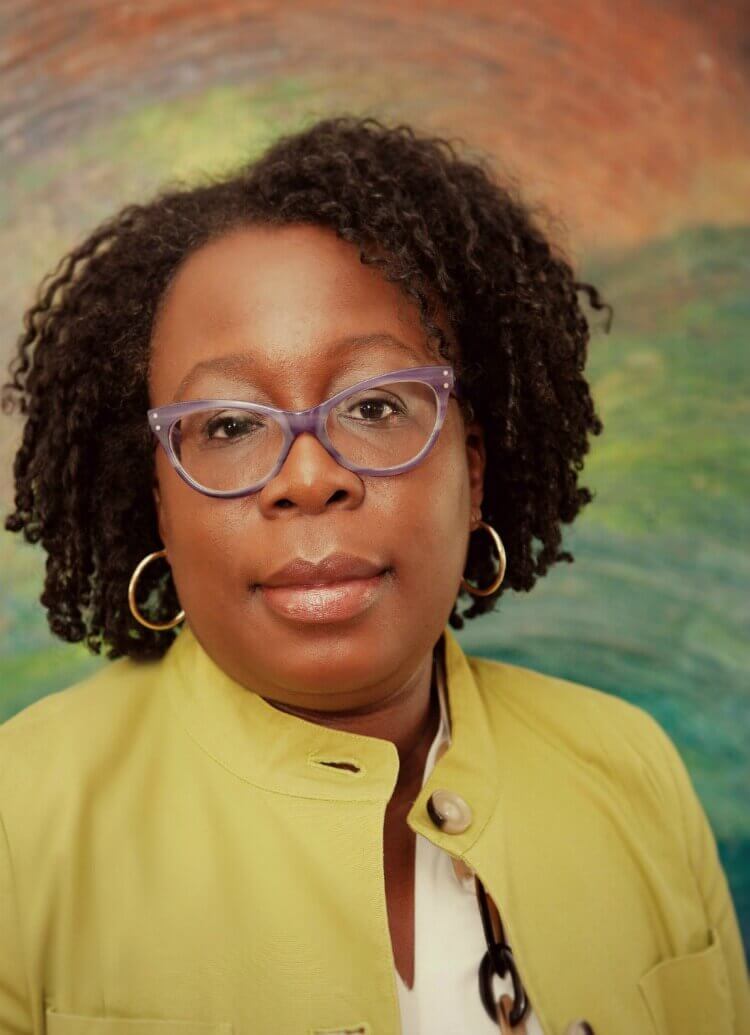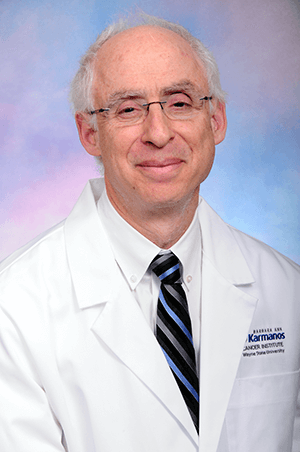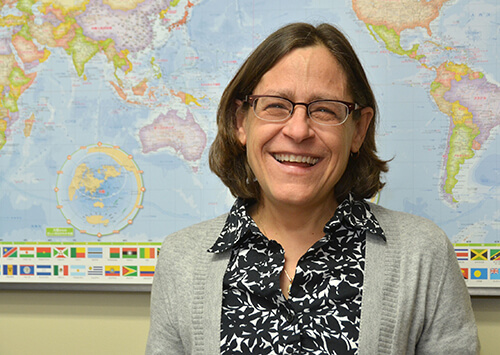Cancer and COVID-19 vary vastly in their classification, treatment and symptoms but the two have something in common: they are disproportionately affecting the African-American community, not only in Detroit, but also in other parts of the nation.
At the Barbara Ann Karmanos Cancer Institute, clinical and scientific researchers focus on developing treatments for cancer. In doing so, they are also examining factors that have led to the African-American population shouldering the heavy burden of cancer. Now, the global COVID-19 pandemic is providing a new lens through which researchers can examine disparities in care. Through dedicated departments, programs and staff whose sole function is to understand the socioeconomic and systemic factors that explain these common health disparities, Karmanos is able to work towards solutions that create equity.
Hayley Thompson, Ph.D., serves as the associate center director for Community Outreach and Engagement, which oversees the Office of Cancer Health Equity and Community Engagement. “When we think about how COVID-19 has affected minority populations, the factors that contributed to the unequal burden of cancer on the African-American community are the same factors that contributed to the burden of the coronavirus on African Americans.”
Research shows that these factors include racial bias on the part of health care providers, breakdowns in patient-provider communications, mistrust of the medical community from minority groups and issues of health literacy. Underserved groups also face a lack of access to financial resources, insurance coverage and quality health care overall.
“I tell a lot of my colleagues, we’re all COVID-19 researchers to some extent,” Dr. Thompson said. “The way people manage their health care is affected by COVID-19. The virus has made it more difficult for people to maintain their health. We know people haven’t been able to get their mammograms or colonoscopies. What does this mean for people who already have a mistrust of the medical community?”

As a National Cancer Institute-designated comprehensive cancer center based in Detroit, Karmanos is responsible for serving everyone in the community through education, diagnostic and treatment services. The Institute recently received a five-year, $3 million grant from the National Institutes of Health (NIH) to identify targets of change and ways to address causes of poorer health-related quality of life experienced by African-American cancer survivors.
Thompson and her colleagues have also developed a survey about COVID-19 and social distancing to determine their effect on cancer care across the continuum, including cancer screening, treatment and prevention. They hope to reach 2,000 people.
“When we think about how COVID-19 has affected minority populations, the factors that contributed to the unequal burden of cancer on the African-American community are the same factors that contributed to the burden of the coronavirus on African Americans.”
Karmanos also has a Populations Studies and Disparities Research (PSDR) program, in collaboration with Wayne State University School of Medicine (WSU SOM). The staff at PSDR secured the $3 million NIH grant. PSDR’s goals are to identify risk factors underlying disease onset and progression and develop and test intervention strategies to reduce risk and improve diagnosis, treatment and outcomes of cancer. The primary intended outcome is to decrease race- and ethnicity-related disparities and overall disease burden.
PSDR’s other areas of study include investigating the distribution and determinants of cancer and cancer risk, survivorship and outcomes, with attention to racial and ethnic disparities. Program members examine patient, family member, physician and community interactions and behavior in order to understand and conduct interventions. These interventions address cancer risk, treatment and outcomes.
PSDR members collaborate with Karmanos oncology physicians and researchers from 14 multidisciplinary teams (MDT). Each team consists of specialists who are focused on a particular cancer and work closely with the patient to offer the best treatment options.
Michael Simon, M.D., co-leader of the Breast Oncology Multidisciplinary Team, is partnering with members of PSDR to conduct a literature review of approximately 90 articles that Karmanos and WSU SOM have published over the last 30 years regarding health disparities and the African-American population in Detroit and the state of Michigan.
Dr. Simon said he was inspired to conduct this literature review after hearing WSU President M. Roy Wilson in an interview about COVID-19 disproportionately affecting African Americans.
“We’ve known this about cancer for more than 30 years,” Dr. Simon said. “I was motivated to email him (and suggest that) maybe an oncologist working in Detroit can help to understand why the coronavirus is affecting more African Americans. We’ve learned a lot of lessons in cancer and could take all the work that we’ve done and create a review article that could provide commentary on coronavirus and underserved populations.” Dr. Simon and his colleagues hope to have the article published in the next couple of months.
While the epidemiology of coronavirus infection is different from cancer, Dr. Simon said the same living conditions that place African Americans at greater risk of coronavirus also contribute to a lack of timely screenings for cancer among this population. African Americans have the lowest survival rate of any racial or ethnic group in the United States for most cancer, according to Karmanos research.
Beyond addressing issues of health disparities and comorbidities that contribute to cancer diagnoses and higher risks of coronavirus infections, Dr. Simon believes communication between doctor and patients can help close the health disparities gap.

Susan Eggly, Ph.D., professor and a member of the PSDR program, agrees and focuses her research on the ways that patients and providers communicate, particularly around clinical trials. She leads the Partnering Around Cancer Clinical Trials (PACCT) study which is designed to encourage physicians to offer trials to all eligible patients using high-quality, patient-centered communication. The overall goal of the study is to test two communication interventions, one for patients and another for physicians, as a way to increase the rates at which African-American and White men with prostate cancer participate in clinical trials based on informed decisions.
With permission from patients, family members and providers, clinical interactions are recorded and reviewed as a way to better understand and improve patient-physician communication. In addition, videos from these interactions are re-enacted and used to provide evidence-based instruction to both providers and patients. These videos are utilized in training modules, which include techniques and instruction for better care. Thus far, 16 Karmanos network locations in Michigan have benefited from using these videos and reported positive results. These latest training modules will soon be available nation-wide.
“Nationally, we see that African-American patients are less likely to ask questions and state concerns and that doctors provide less information to African-American patients. Our work encourages patients to participate actively during clinic visits by asking questions and stating concerns, and doctors to elicit patients’ questions and then answer them fully,” said Dr. Eggly.

Through many initiatives, Karmanos Cancer Institute is dedicated to comprehensive work aimed at ending racial disparities in health care. While the work is data-driven and rigorous, it also requires adaptation at a more human level.
As Dr. Simon puts it, “I’m thinking about how we can become better health providers for all people. I think it has to do with getting to know people on a personal level. We really have to mix it up and have dialogue as real people.”